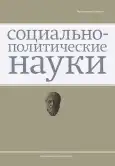Features of China’s Sports Diplomacy
- Authors: Liu Z.1
-
Affiliations:
- St. Petersburg State University
- Issue: Vol 13, No 3 (2023)
- Pages: 138-144
- Section: International Relations, Global and Regional Studies
- URL: https://bakhtiniada.ru/2223-0092/article/view/145560
- DOI: https://doi.org/10.33693/2223-0092-2023-13-3-138-144
- EDN: https://elibrary.ru/GDEUOI
- ID: 145560
Cite item
Abstract
The author tries in this article to identify the features of China’s sports diplomacy. The author suggests that even before the concept of “soft power” appeared, China used sports to promote itself on the world stage and form a favorable image. It was China that offered Ping-pong diplomacy to the world, which made it possible to establish a dialogue between China and the United States. All other types of Chinese sports diplomacy are also aimed at helping to implement the general strategy of the People’s Republic of China, which should help the country create a special attractive image. The holding of the Olympic Games, the presence of China’s political elite at various sporting events, the support of a number of sports – all this forms a unique phenomenon of China’s sports diplomacy at the present stage of the development of international relations.
Full Text
##article.viewOnOriginalSite##About the authors
Zhaoyi Liu
St. Petersburg State University
Author for correspondence.
Email: liuzhaoyie@gmail.com
postgraduate student
Russian Federation, Saint PetersburgReferences
- Dolgova D.A. Sport as a tool for strengthening the authority of the People’s Republic of China in the international arena. Actual Problems of Modern International Relations. 2017. No. 9. Pp. 98–106. (In Rus.)
- Olympic Powers. Russia and China have launched Years of sports exchanges. 03.02.2022. https://ria.ru/20220203/sport-1770930477.html (data of accesses: 22.05.2023).
- Zedong M. About the democratic dictatorship of the people. On the 28th anniversary of the founding of the Communist Party of China (June 30, 1949). URL: http://library.maoism.ru/demdic.htm (data of accesses: 22.05.2023).
- Juntao V. Features of public diplomacy of the People’s Republic of China (historical aspect). Russia in the Global World. 2021. No. 21 (44). Pp. 67–80. (In Rus.)
- Chadwick S. “Stadium diplomacy” of China in Africa. 02.03.2016. URL: http://www.sportdiplom.ru/chinasport/stadionnaya-diplomatiya-kitaya-v-afrike?ysclid=lf1gbnl393487886898 (data of accesses: 22.05.2023).
- Shepelyuk O. How Chinese sports diplomacy is being built. Belarusians and the Market. 30.12.2022. (In Rus.) URL: https://belmarket.by/news/news-51936.html?ysclid=lf1gl2kpt5983913831 (data of accesses: 22.05.2023).
- Amaresh P. China’s stadium diplomacy: All that glitters is not gold. Extraordinary and Plenipontiary Diplomatist & Analysing Internashional Relation. November 3, 2020. URL: https://diplomatist.com/2020/11/03/chinas-stadium-diplomacy-all-that-glitters-is-not-gold/ (data of accesses: 22.05.2023).
- An Y., Wang X., Xiang F. The Evolution of China’s Sporting Diplomacy since 1949. The History, Experience and Promotion Strategie Collegium Antropologicum. 2021. Vol. 45. No. 3. P. 276.
- Andrews E. How Ping-Pong Diplomacy thawed the Cold War. 2018. URL: https://web.archive.org/web/20190603050327/http://www.history.com/news/ping-pong-diplomacy (data of accesses: 22.05.2023).
- Aryabaha E.Ph. The role of the Beijing Olympics in China’s public diplomacy and its impact on politics, economics and environment. 2010. URL: https://www.diplomacy.edu/wp-content/uploads/2021/06/30112010134404_Aryabaha_28Library29.pdf (data of accesses: 22.05.2023).
- Chang W., Xue Ch., Ding G. Architecture of diplomacy: Chinese construction aid in Asia, 1950–1976. Arena Journal of Architectural Research. 2019. № 4 (1). P. 3. DOI: http://doi.org/10.5334/ajar.147
- Chen C.C., Colapinto C., Luo Q. The 2008 Beijing Olympics opening ceremony: visual insights into China’s soft power. Visual Studies. 2012. Vol. 27. Issue 2. Рp. 188–195.
- Chen S., Zheng J. China’s strategies to host the sports mega events // Sport Policy in China. London 2018. Pp. 130–149.
- Copper J.F. China’s foreign Aid 1978 occasional papers: Reprints series in contemporary Asian studies. November 8, 1979. No. 29. URL: https://core.ac.uk/download/pdf/56353791.pdf (data of accesses: 20.05.2023).
- De la Cretaz B. How a ping-pong game helped end the Cold War. 02.09.2018. URL: https://www.upworthy.com/how-a-ping-pong-game-helped-end-the-cold-war (data of accesses: 22.05.2023).
- Fischbeck F. Ping Pong diplomacy. Establishment of Sino-America Détente. 1972. URL: https://www.frankfischbeck.com/ping-pong-diplomacy/ (data of accesses: 22.05.2023).
- Ge S. The great historic journey of Chinese diplomacy. China International Studies. 15.12.2017. URL: https://www.ciis.org.cn/english/ESEARCHPROJECTS/Articles/202007/t20200715_3607.html (data of accesses: 22.05.2023).
- Macintosh D., Greenhorn D. Hockey Diplomacy and Canadian Foreign Policy. Journal of Canadian Studies. 1993. Vol. 28. No. 2. URL: https://utpjournals.press/doi/epdf/10.3138/jcs.28.2.96?role=tab (дата обращения: 22.05.2023).
- Nixon R.M. Foreign relations of the United States, 1969–1976. Vol. I: Foundations of foreign policy, 1969–1972. URL: https://history.state.gov/historicaldocuments/frus1969-76v01/d3 (data of accesses: 22.05.2023).
- Premier Li’s tour to America. Day 6: “Ice hockey diplomacy” strengthens China-Canada friendship. 24.09.2016. URL: http://english.www.gov.cn/premier/photos/2016/09/24/ content_281475450448437.htm (дата обращения: 22.05.2023).
- Rapprochement with China, 1972. In: Milestones: 1969–1976. URL: https://history.state.gov/milestones/1969-1976/ rapprochement-china (дата обращения: 22.05.2023).
- Vondracek H. China’s stadium diplomacy and its determinants. A Typological Investigation of Soft Powe Journal of China and International Relations. 2019. Vol. 7. No. 1. Pp. 62–86. URL: https://journals.aau.dk/index.php/jcir/article/view/6638/5756 (дата обращения: 22.05.2023).
- The Chinese government’s eight principles for economic aid and technical assistance to other countries. January 15, 1964. Wilson Center. Digital Archive International History Declassified. URL: https://digitalarchive.wilsoncenter.org/document/ 121560 (дата обращения: 22.05.2023).
Supplementary files








